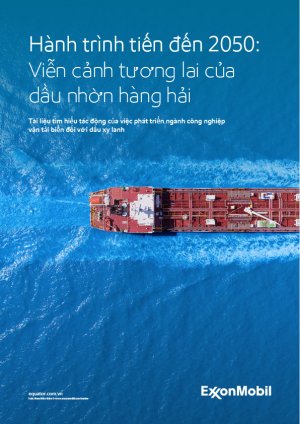Setting sail for 2050: Imagining the future of marine lubrication
Thursday, 24/09/2020, 09:26 GMT+7

|
|
The maritime industry is undergoing seismic shifts of mounting complexity – a process set in motion by the International Maritime Organization’s (IMO) 2020 sulphur cap on marine fuels. The pace of these shifts is only going to accelerate as the next major hurdle of the 2050 Green House Gas emissions regulation approaches. Regulatory and commercial pressures are driving the need for more efficient, cleaner engines, higher quality fuel and digitization. The knock-on effects to vessel operations will demand greater collaboration and a more sophisticated approach throughout the shipping industry. This is especially true in the area of cylinder lubrication. Read ExxonMobil’s conclusions on how engine lubrication is key to meeting emissions targets in our Future of Lubrication white paper. Here’s what you can find inside:
By reading this white paper, we hope to give you an insight into how the sustainability goals of tomorrow, start with action today. |
Your Comments
Other news
Trong phần 1 và phần 2 của series, chúng ta đã cùng nhau phân tích sâu về những quy định của IMO 2020 và các thách thức kỹ thuật không thể xem nhẹ khi vận hành ...
Trong phần 1 của series, chúng ta đã cùng nhau tìm hiểu những quy định cốt lõi của IMO 2020. Việc chuyển đổi sang sử dụng Nhiên liệu có hàm lượng lưu huỳnh ...
Kể từ ngày 1 tháng 1 năm 2020, quy định của Tổ chức Hàng hải Quốc tế (IMO) về việc giới hạn hàm lượng lưu huỳnh trong nhiên liệu hàng hải đã chính ...
Another big success in lowering carbon
The marine industry is facing growing demands to develop more sustainable ways of operating. As a result, many established practices are being called into question, including the bulk delivery of ...
Mobilgard™ 540 AC is a new premium 40BN marine cylinder oil developed by ExxonMobil
ExxonMobil hosted an online discussion in association with The Motorship in early October that brought together senior figures from across the marine industry to discuss the challenge of ...
The International Maritime Organization (IMO) adopted its initial levels of ambition for a quantitative fall in marine industry greenhouse gas emissions (GHG)
The maritime sector is experiencing radical change from two directions; the drive towards decarbonisation and the growth of digitisation. Both are set to radically change the management and operation ...
International Maritime Organization’s (IMO) 2020 sulphur cap has resulted in some much-publicised changes to marine fuel formulations









__imo5.png)
__BYn_sao_cYa_Health_1.png)
__IMO_2020_cover.png)
__facility_management_2.jpg)
__2272977.jpg)
__marine-navigational-officer-chief-mate-navigation-watch-ship-vessel_461973-2206.jpg)
__istockphoto-1323550608-612x612.jpg)
__Untitled.jpg)
__iStock-1148527893_V2.jpg)
__Oil-Analysis-2-640x480.jpg)
